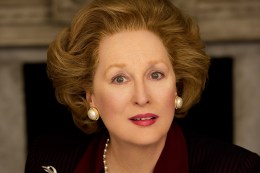
In a recent issue of TIME, we postulated Firth’s Theorem, a simple equation for calculating a movie’s odds of winning nominations and statuettes during awards season. Here’s how it works:
1) Is the movie about famous, real-life people? If so: +1
2) Are the main characters British? +1
3) Are any of them British royalty? +1
4) Does the protagonist have a poignant physical or mental affliction? +1
5) Is Harvey Weinstein involved? +1
Firth’s Theorem is named for the Englishman who helped score a perfect 5 last year as the stammering George VI in the Weinstein Co.’s The King’s Speech, winner of four Academy Awards. High Firth scores often correlate with strong Oscar showings: The Queen (2006), with a Firth score of 3, won Best Actress for Helen Mirren; Elizabeth: The Golden Age (2007) and The Young Victoria (2009), also with scores of 3, each received a little gold man. In 1999, Shakespeare in Love racked up a 4 and took home seven statuettes. (Last spring’s blockbuster reality show The Royal Wedding, with a star-making turn by Pippa Middleton, scored a 3 but is ineligible for the Oscars.)
These films belong to a subgenre — and awards-season staple — we’ll call the Anglophile Biopic. The latest AB is this month’s Weinstein release The Iron Lady, which stars Meryl Streep as Margaret Thatcher and devotes much of its running time to the former Prime Minister’s dotage as she succumbs to dementia. Streep has already won Best Actress from the New York Film Critics Circle; this week, she received Screen Actors Guild and Golden Globe nominations, and she’s all but assured the same from the Oscars. No surprise, since The Iron Lady rates a 4 on the Firth scale — it’s missing only a dash of royalty. Another Weinstein film, My Week with Marilyn, has a shockingly high Firth rating of 4 despite its iconic American protagonist (English setting, Kenneth Branagh imitating Sir Laurence Olivier, etc.). Sure enough, it also snagged two SAG nominations, for star Michelle Williams (as Marilyn Monroe) and for Branagh, and three Golden Globe nods; Williams also won Best Actress from the Boston Society of Film Critics last weekend.
(LIST: The Top 10 Biopics)
The AB’s appeal to American Oscar voters is easy to parse. Stateside Anglophilia is, like Firth’s Theorem, a matter of simple addition: colonial nostalgia (for the bratty aristo-Brits we call the Founding Fathers) + displaced princess fantasies + a guilty attraction to tidy class hierarchies + an assumed link between intelligence and perfectly rounded vowels. As for the biopic part of the equation, Academy voters love them because the acting can be fact-checked: “Does this famous person remind me of this other famous person?” is answered more readily than “Did this actor convincingly conjure a fictional being from scratch?” (Five out of the last seven Academy Award winners for Best Actor have gone to performers playing real-life people.)
Streep’s impersonation of Thatcher is predictably excellent: she nails the hawklike posture and roiling persecution complex, if not the lead-with-the-overbite speaking style. Where The Iron Lady departs from the successful AB formula is in refusing to burrow into a discrete pocket of time. The Queen confined itself to the immediate aftermath of Princess Diana’s death, The King’s Speech to the painful prep for a radio address; My Week with Marilyn announces its time frame in its title. This viewer-friendly temporal discipline is typical even of lesser ABs such as multiple Oscar nominee Frost/Nixon (Firth score: 2.) It also seems to be the template for the forthcoming Princess Diana biopic starring Jessica Chastain, which will hone in on just a couple of years toward the end of Diana’s life.
(MORE: See Meryl Streep on our Top 10 Movie Performances of 2011)
The Iron Lady yearns for such focus, retreating again and again to Thatcher’s twilight years as she mooches around the house and chats with her dead husband. The flashbacks to peaks and valleys in her political career are pro forma and jumbled, while her many adversaries fall into two cartoonish categories: members of a rabid mob or jowly Old Etonian snobs. A more incisive movie would, like ABs of yore, stick to one defining episode (her rise to the prime ministership, the Falklands war) or perhaps a single year of her reign. For example, Thatcher began 1981 with record-low approval ratings and faced riots, hunger strikes and economic turmoil, yet emerged the following year with her power entrenched. Legend has it there was a royal wedding in 1981 too.
LIST: The All-TIME 100 Movies

